- News
- Reviews
- Bikes
- Components
- Bar tape & grips
- Bottom brackets
- Brake & gear cables
- Brake & STI levers
- Brake pads & spares
- Brakes
- Cassettes & freewheels
- Chains
- Chainsets & chainrings
- Derailleurs - front
- Derailleurs - rear
- Forks
- Gear levers & shifters
- Groupsets
- Handlebars & extensions
- Headsets
- Hubs
- Inner tubes
- Pedals
- Quick releases & skewers
- Saddles
- Seatposts
- Stems
- Wheels
- Tyres
- Tubeless valves
- Accessories
- Accessories - misc
- Computer mounts
- Bags
- Bar ends
- Bike bags & cases
- Bottle cages
- Bottles
- Cameras
- Car racks
- Child seats
- Computers
- Glasses
- GPS units
- Helmets
- Lights - front
- Lights - rear
- Lights - sets
- Locks
- Mirrors
- Mudguards
- Racks
- Pumps & CO2 inflators
- Puncture kits
- Reflectives
- Smart watches
- Stands and racks
- Trailers
- Clothing
- Health, fitness and nutrition
- Tools and workshop
- Miscellaneous
- Buyers Guides
- Features
- Forum
- Recommends
- Podcast
feature
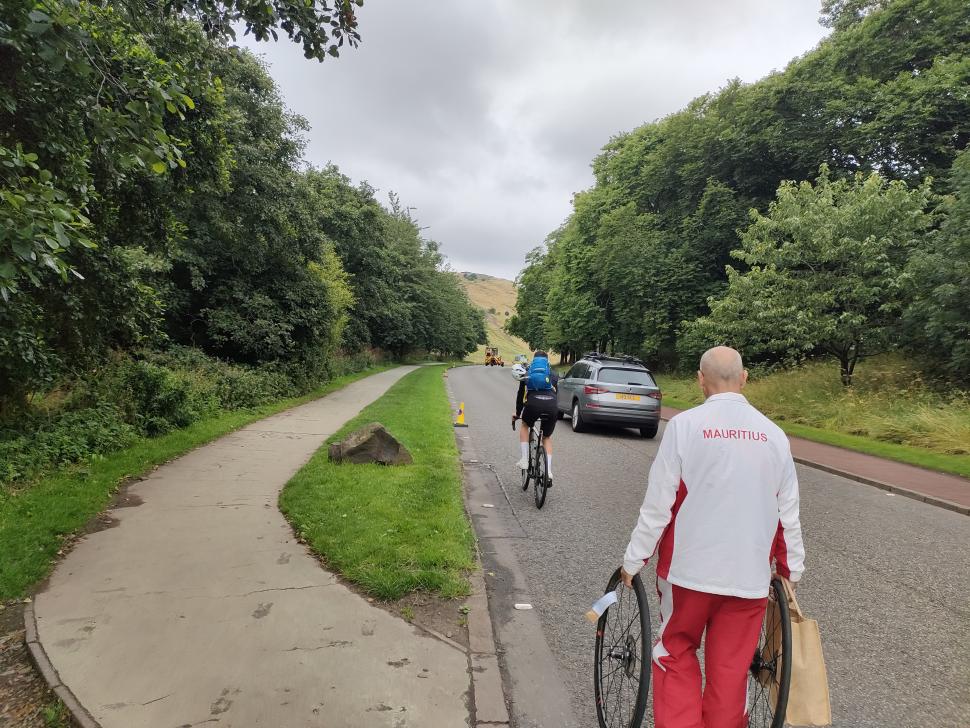 The Mauritius rider and soigneur make their way to the start of the 2023 men’s elite world road race championships in Edinburgh (Ryan Mallon)
The Mauritius rider and soigneur make their way to the start of the 2023 men’s elite world road race championships in Edinburgh (Ryan Mallon)Bus sandwiches, hitching lifts, and paying your own way: The not so glamorous life of a small nation at the world championships
During an event like the UCI Cycling World Championships, the spotlight, and therefore the attention of the fans and media, tends to fall on the Mathieu van der Poels and Lotte Kopeckys of the peloton as they battle for those coveted rainbow bands and a place in cycling history.
But unlike, say, the highly controlled and professionalised environment of the Tour de France, the open nature of the worlds – and other major international events such as the Olympics or Commonwealth Games – means that every so often an assortment of lesser-known riders, representing nations from outside cycling’s traditional European heartlands, get the opportunity to race alongside Remco, Marianne, and the rest, often on a shoestring budget and with minimal support.
At last week’s world championships in Glasgow road.cc, via an accidental bus journey, set out to explore the challenges these smaller nations face on the road to competing with the world’s best.
(Alex Broadway/SWpix.com)
On the Buses
It was around 6.20am, three hours before the riders were set to depart from Holyrood, and just as the grey and hazy Glasgow morning began to succumb to the faintest glimmer of unexpected sunshine, that I realised something quite important: I was on the wrong bus.
Now, it may have been down to my own tiredness, or the heady atmosphere of a city still grimly clinging onto the remnants of the previous night, or the coach driver’s muttered and ultimately flawed assertion of “Aye, media, Edinburgh”, but the fact remained. Rather than travelling to the foot of Arthur’s Seat for the start of the men’s elite world road race championships in the company of my fellow journalists and photographers, it soon dawned on me that I was instead sitting alongside several riders preparing to take on all 271km of that very same race.
Because, unlike the British squad, huddled up with a cup of tea and working WiFi in the Ineos ‘Death Star’, or even the camper-sporting Irish contingent, these riders – all featuring on the same start list as Wout van Aert and Tadej Pogačar, remember – were forced to make their way across Scotland’s Central Belt on the kind of coach probably called upon in most other weeks to transport historically apathetic American tourists to Culloden or the ‘Harry Potter bridge’ at Glenfinnan.
Instead, on this early Sunday morning on Wilson Street, the bus contained the kind of dazzlingly colourful tracksuits only seen on the global cycling stage once a year, belonging to the sole representatives, and their soigneurs-cum-mechanics, of the likes of Guyana, Panama, Cape Verde, and the British Virgin Islands (the flagbearer of the smallest nation of the lot, Vatican City’s Rien Schuurhuis, was not on board, however. Rumours he travelled to the start by Popemobile remain unconfirmed).
(Pauline Ballet/SWpix.com)
While some of these bus-boarding racers appeared extremely prepared for the task in hand – one spent the entire hour-and-a-half-long journey wearing his helmet – others were decidedly less so. As our coach driver finally began to inch along Glasgow’s deserted streets, with a van carrying the riders’ bikes leading the way, we were brought to an abrupt halt by a desperate shout from behind and the equally desperate sight of a national staffer running in the middle of the road wielding an apparently forgotten spare back wheel.
Wheel restored to its rightful owner and eventually onto the motorway, the coach’s eerie silence punctuated only by the soft murmurings of the driver’s favourite country music station and the crackle of the occasional social media video, I noticed China’s Haoyu Su sitting across from me. Resting his feet on the empty seat beside him, the 22-year-old was tucking into what appeared to be a Lidl meal deal sandwich and yoghurt. No carefully calculated nutrition plans here, then.
(About nine hours later, as the late afternoon rain pounded Glasgow’s increasingly slippery streets, Su would politely – but firmly – rebuff my request for a quick chat following his DNF, in favour of some shelter at his hotel. Which was fair enough, I suppose.)
No time to stop for sandwiches for Haoyu Su during the TT in Stirling (Zac Williams/SWpix.com)
By the time our bus of intrepid quasi-privateers reached Auld Reekie, via a convoluted route designed to beat the road closures and, no doubt, the Fringe’s most enthusiastic street performers, sign-on had already begun, and the flag-waving, coffee-guzzling crowds had started to form in Holyrood Park.
Not that all that mattered to the coach driver, however, who proceeded to drop us off deep inside the park, a good mile away from the sign-on platform, and even further away from Remco Evenepoel and the rest’s plum parking spots, situated a stone’s throw from the official start at the foot of the Royal Mile.
As the riders grabbed their bikes from the poorly parked van which had been carrying them, I made my way to the start alongside the soigneur for Mauritius, a mountainous island nation in the Indian Ocean, about 2,000km off the southeastern coast of Africa.
Carrying two wheels and a paper bag in one hand, and a cigarette in the other, he filled me in on the details of his sole rider, who was freewheeling a few feet in front, sporting a blue backpack and taking in the Salisbury Crags.
I’m sure there’s a Scottish song that pithily sums up the feeling of having to walk a great distance, but I just can’t think of it right now…
“That’s Christopher Rougier-Lagane,” he tells me, as we’re continuously passed by race vehicles obviously deemed worthy enough to enter the sacred zone of the makeshift start village by car. “He won the national road race championships in June, and he’s won the time trial six times, even though he’s only 24.
“He’s had some decent results in the African championships, and he rode the Commonwealth Games last year, but this is his first worlds. He’s one of our best riders, but he’s not a pro or anything, he just races for his local club.”
Ah, brilliant. I’m sure he’s buzzing, I offer, to a mere shrug of the shoulders from the chain-smoking swannie. So, what’s your plan for today then, I ask.
“Oh, well the first thing I have to do is make sure I get a lift in a car.”
Have you organised anything?
“No, not at all. But I’m sure someone will have at least one space for me. And if not, I can squeeze in somewhere hopefully.”
On that optimistic, if somewhat nonchalant, note, I wave Rougier-Lagane and his soigneur off on their way. And in what felt like no time at all since we shuffled down the steps of our coach, I watch as the 24-year-old takes to the sign-on podium, clad in the rather cool all-black kit of his country, and receives the applause of the gathering crowd.
(Pauline Ballet/SWpix.com)
Rougier-Lagane’s return trip to Glasgow was evidently more painful than the outward morning one, as he climbed off his bike on one of the opening laps around the city’s urban circuit. A few days later, he would secure a more than respectable 57th at the men’s elite individual time trial in Stirling, one place ahead of his fellow coach traveller Su Haoyu, after also leading Mauritius’ six-rider squad to 16th (out of 18) in the mixed relay.
One of Rougier-Lagane’s mixed relay teammates, part-roadie, part-MTBer Kim Le Court, enjoyed a particularly fruitful spell in Scotland, finishing 64th in the elite women’s road race after featuring strongly in the sizeable second group that stuck together for most of the six laps around Glasgow.
Pretoria-born Le Court’s decent showing in the road race followed an even more noteworthy display in the mountain bike cross-country marathon race in Glentress Forest the week before, taking tenth place despite, in her own words, “blowing so hard” with 15km to go.
Le Court, in the red helmet, rides alongside teammates Aurelie Halbwachs and Raphaelle Lamusse during the mixed relay TTT in Glasgow (Ian MacNicol/SWpix.com)
“Crossing the finish line as the tenth best in the world was definitely a feeling I will cherish for a long time, even though I aim to surpass it in the near future,” the 27-year-old posted on Instagram after her impressive result, which she described as the “realisation of my long-held dream” and a “testament to the path I’ve travelled”.
“Left to fend for ourselves”
While Le Court and Rougier-Lagane’s road to the worlds is certainly the one less travelled, I later discovered that Mauritius – despite the DIY feel of that Sunday morning coach journey – can appear, at least to some, to represent the pinnacle of preparation and support compared to a few of their fellow ‘smaller’ nations.
One African rider, who wished to remain anonymous, offered a scathing critique of his country’s cycling federation and its approach to major championships like the worlds, where he claims he and his compatriots are simply “left to fend for ourselves”.
(Thomas Maheux/SWpix.com)
“We get very little support from our federation to race the world championships, almost none in fact,” the African rider told me, as we stood on the packed, vertiginous urban slopes of Montrose Street during the elite women’s road race.
“After our national champs are held – which we get informed of about two weeks in advance, so you don’t have much time to prepare for that either – you get selected for the worlds. We get around three weeks’ notice that we’re selected, and from there on we’re pretty much alone to make our own way.
“For myself, it was a matter of then booking flights, accommodation, figuring out where everything is. Then you have to sort out everything from all the way from the airport, to transporting your bike to the hotel, if you want a soigneur you have to do it of your own accord.
“For the races, you rent a vehicle, you transport yourself to the event, you buy all your nutrition yourself. At the feed zones, I know a couple of people, so can arrange something in advance. For the few of us who can get here, we race quite often on our own, so we’ve become comfortable racing in these conditions.”
But surely, riders representing their country, racing in their national colours, on one of cycling’s biggest stages are bound to receive some kind of external assistance that sets them apart from those watching the racing from the roadside?
The African rider shakes his head ruefully.
“Our country’s federation manager would speak to the UCI, but that’s only after we’ve asked him about where we need to be for registration, where everything is held,” he says.
“We book everything ourselves, and we pay for everything ourselves. Our federation doesn’t pay for our riders. And nobody is a full-time pro – we all have to book time off work to be here.
“This year, I believe, one of our U23 riders got some help from the UCI, for his flights. So to be fair, I know that the UCI have done their part. But in terms of the rest of our country’s riders, we’re left to fend for ourselves.”
While it’s clear that many riders at the worlds are forced to resort to the kind of DIY mentality usually confined to the early Henri Desgrange era of the Tour de France, even those smaller nations that have the backing of their federations, and in many cases the government, can struggle due to their standing in the pro cycling hierarchy.
(Ed Sykes/SWpix.com)
Argentina, for example, though hardly a minnow in sporting terms, remains worlds apart from cycling’s traditional European heartlands in terms of the quality and depth of its talent pool, which has to battle and scrap to qualify for major championships.
This precarious status, the country’s head of track and road, Marcelo Lanzi, tells me, often leads to necessary but stressful bouts of last-minute planning, and therefore rising costs (a lack of preparation time evidenced in the fact that the entire Argentina squad shared a cramped budget hotel – owned by an equally budget-oriented airline, so you can hazard a guess – with this very, not so high flying, writer).
“We have a big team, 38 people, all in different locations, so the organisation is very complicated. The process for these combined world championships is like the Olympic Games, so we’ve done it before,” Lanzi says.
“But the preparation takes a long, long time. You have qualification, and when you know how many people have qualified for the events, you can begin the process of buying plane tickets, hotel reservations.
“Argentina isn’t like Great Britain or France. Those countries are sure of their participation, with full teams on the track and on the road. We have three or four riders for the track, but it’s only at the last minute, when the qualification system is over, I know how many people are able to come.
“The preparation time, then, is small. And of course, the prices for things are different when you pay three months beforehand, instead of 20 days. The possibilities and cost of where you can stay change a lot depending on time. But in Argentina, we’re helped by the government, which covers our expenses, so there are no financial worries.”
“It closes out the sport to a very select few”
The same can’t be said, of course, for the riders from those smaller nations forced to dip into their own pocket for their chance to race against Mathieu, Lotte, and co. – a situation, the anonymous African rider points out, that has the effect of shutting the trap door on entire generations of promising cyclists.
“It closes out the sport to a very select few in our countries,” he says. “Because the riders who are still young and up-and-coming, if they don’t come from a prominent family, they tend to not be able to afford to do all this, or even have the opportunity to come.
“So there are quite a few riders who are exceptionally good, but unfortunately because of their means, they don’t get to come and ride here and represent your country.
“And it’s not like the country doesn’t have the funds available. Our country, one of the wealthiest African countries there is by a long shot, you would expect them to support us better.
“You have countries like Mauritius who do a good job, and South Africa have stepped up their game – having good riders incentivises that. But there are very few countries in Africa that have their act together.”
(Zac Williams/SWpix.com)
But what’s the solution?
“The UCI could probably help by teaching the federations, what it takes to get a rider here and help them with their budgeting,” he ponders.
“I’m getting older, so I want to get on the federation’s board, because it’s my turn to help the up-and-coming riders, and actually see where the funds are going, because I suspect that’s a major part of this.
“To make it better, it has to come from the riders who have experience and want to change things.”
As cycling continues its stuttering march to becoming a properly global sport, it’s clear that the desire and will to change things, to make the world championships truly open to the world – and not just those from the ‘right’ nations, or those who can afford it – is growing every year.
But for now, it seems that for some, the worlds remains a truly solo enterprise, one that involves dipping into your savings, renting cars, and cutting corners. And occasionally hopping on board the odd tourist coach too, of course.
After obtaining a PhD, lecturing, and hosting a history podcast at Queen’s University Belfast, Ryan joined road.cc in December 2021 and since then has kept the site’s readers and listeners informed and enthralled (well at least occasionally) on news, the live blog, and the road.cc Podcast. After boarding a wrong bus at the world championships and ruining a good pair of jeans at the cyclocross, he now serves as road.cc’s senior news writer. Before his foray into cycling journalism, he wallowed in the equally pitiless world of academia, where he wrote a book about Victorian politics and droned on about cycling and bikes to classes of bored students (while taking every chance he could get to talk about cycling in print or on the radio). He can be found riding his bike very slowly around the narrow, scenic country lanes of Co. Down.
Latest Comments
- HKR 2 sec ago
It's not 4k though. It's a 4k sensor. But when image stabilization is on, that's chopped down to little over a 1080 image. ...
- tootsie323 1 hour 17 min ago
Or, possibly, a pretty sharp chip...
- ROOTminus1 5 hours 26 min ago
I struggled to find MTB flat shoes that fit my duck-like feet, and buying regular trainers is a pain enough. When I tried to look at road shoes...
- captain_slog 9 hours 14 min ago
Nice idea. Il Lombardia: la classica delle foglie morte. Because that name, Lake Como in autumn, Coppi and proper climbs.
- Dnnnnnn 9 hours 22 min ago
It might have stretched to that metre, and I suspect it was only available for active travel capital projects - but the general public just see...
- Bungle_52 10 hours 57 min ago
Well now I've heard the excuses and had time to digest them I'm not impressed to say the least....
- Rendel Harris 11 hours 57 min ago
Definitely legal and a number of teams have used them, I remember an interview with IPT's chief technician a couple of years back where he revealed...
- slc 12 hours 9 min ago
I cycled up Marsh Lane yesterday, and went through the bus gate behind the new number 16 bus (temple meads to kingswood via barton hill). So that...
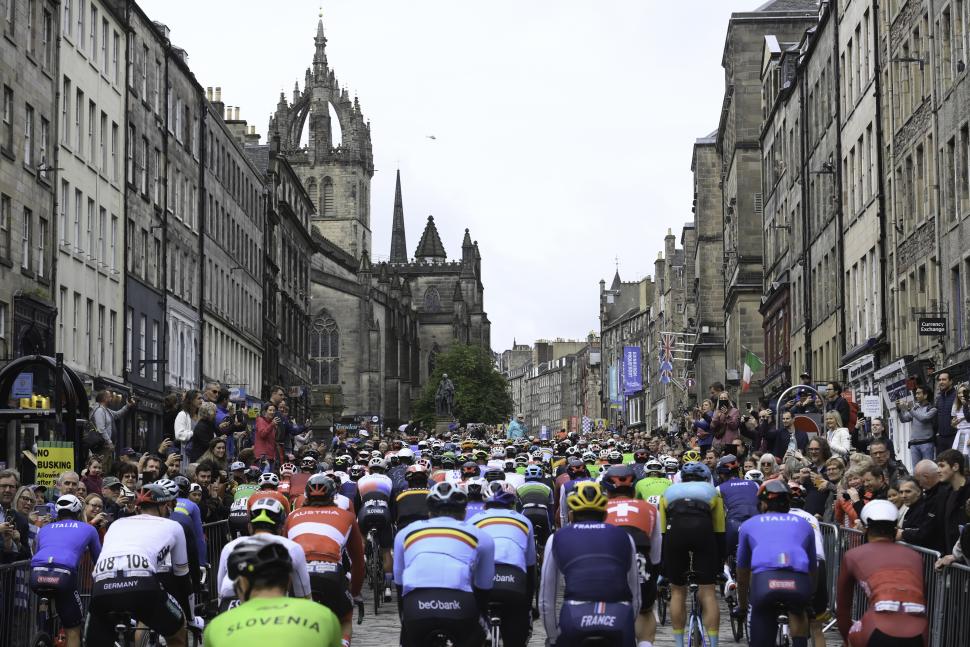
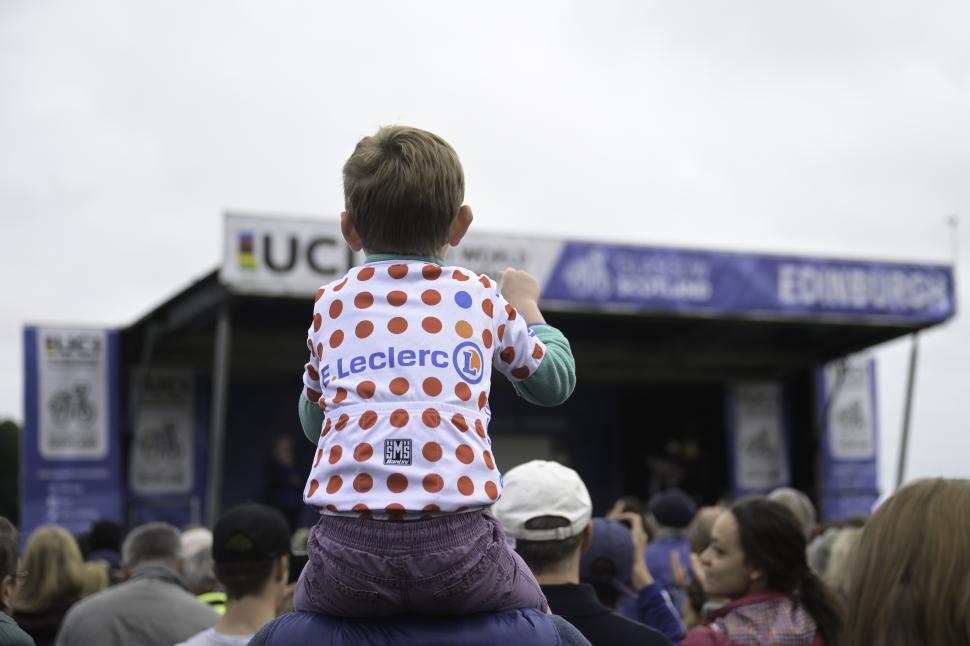

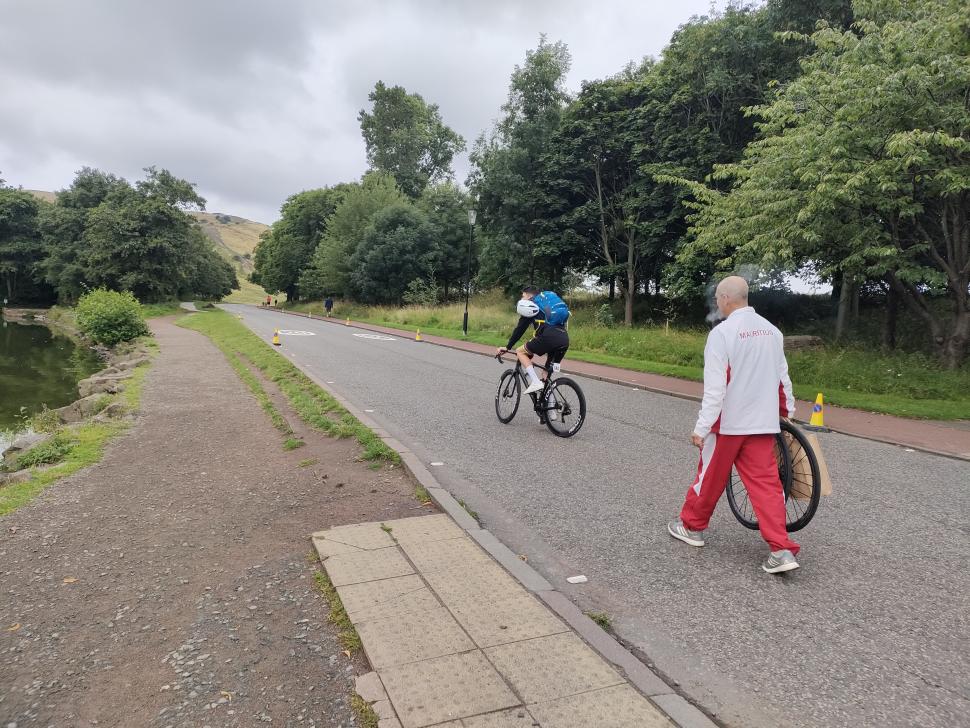

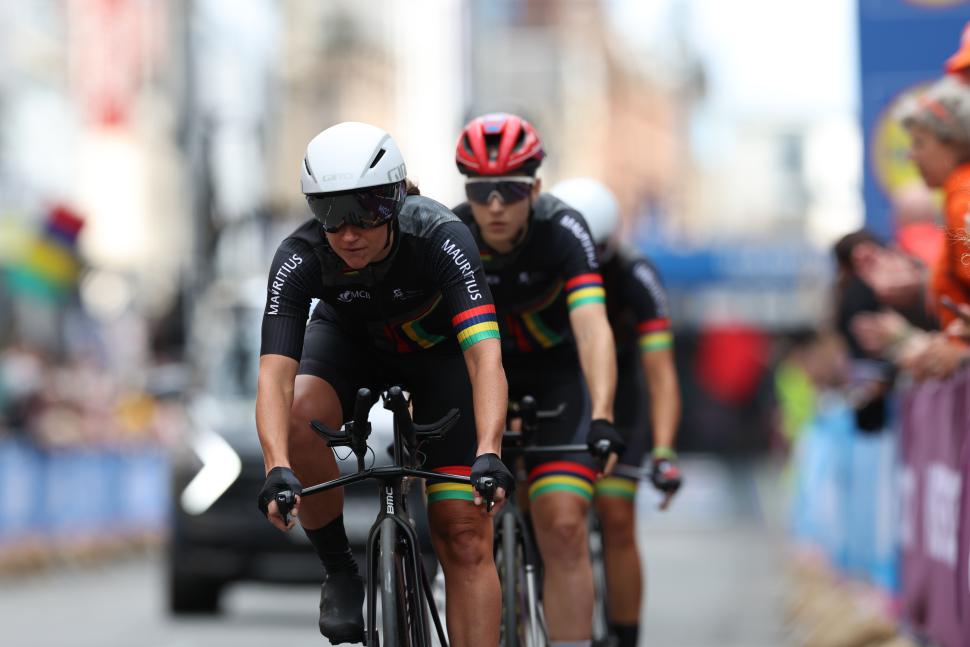
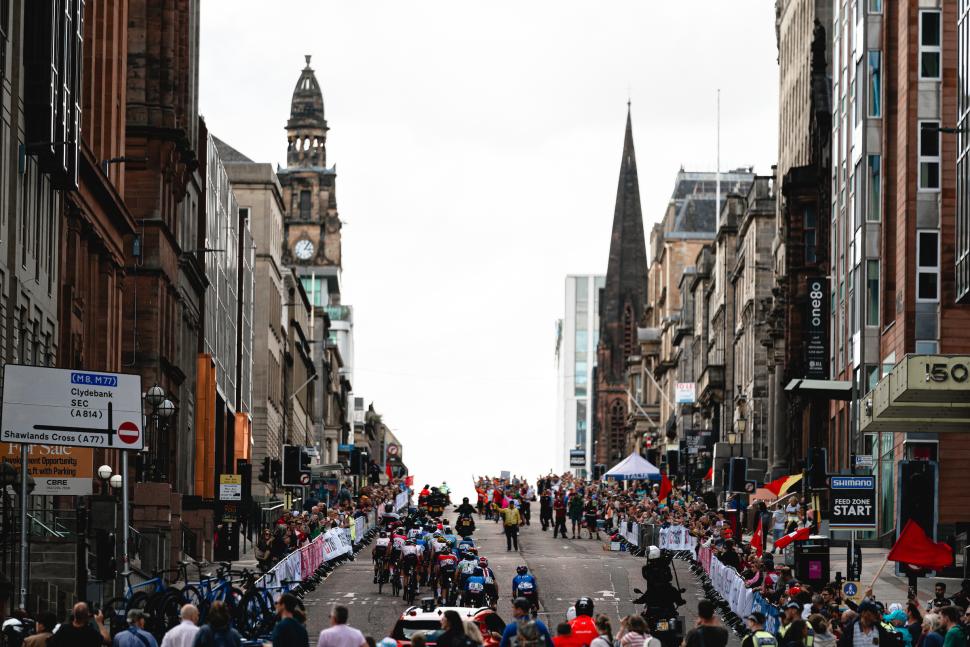
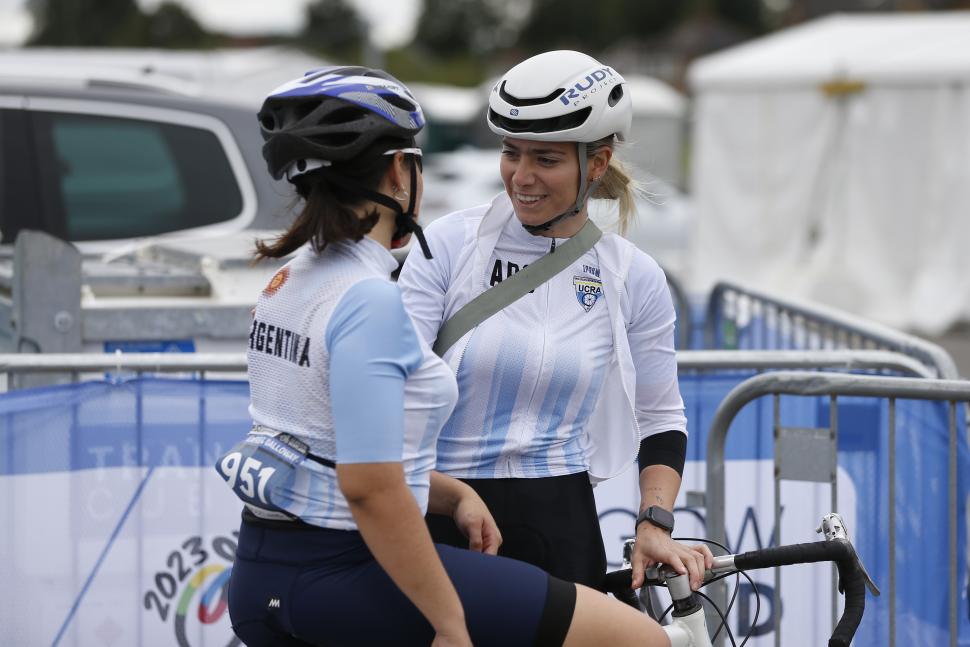
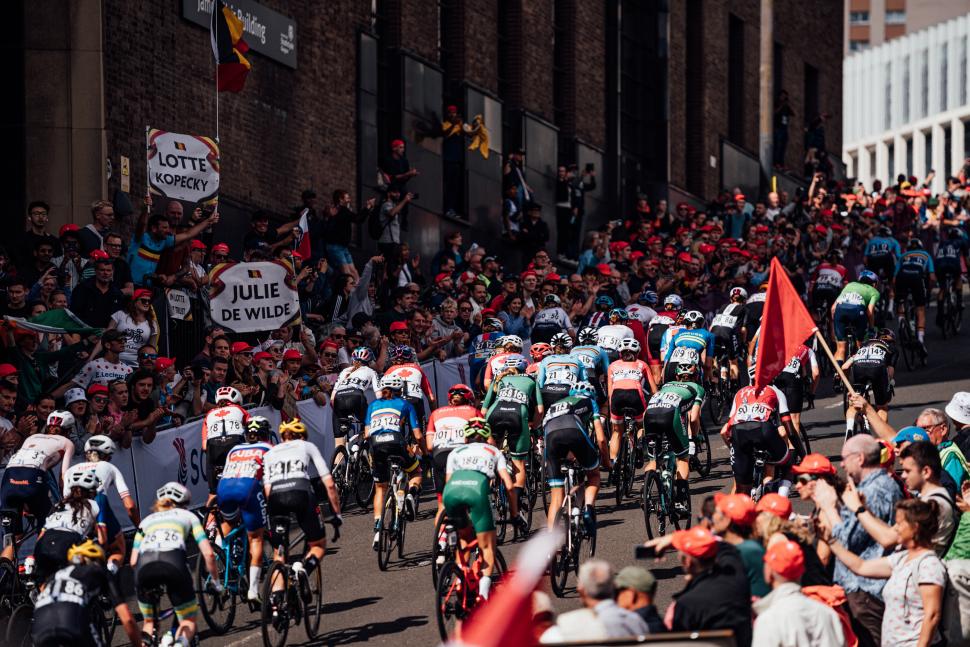
Add new comment
10 comments
Seems like yesterday British team was in similar boat. Sean Yates described putting on jersey... crumbs from cake from previous year (maybe years before that) in unwashed hand-me-down. As for Beryl Burton's and her fellow women's team experiences... even more crude for top rider in the world
Unfortunately there is a lot of inequality in racing, although some could argue that talent will always out in the end. I was amazed when, a few years ago, my family were staying in a small resort in the Jura and the Tour de l'Ain happened to start from it one day. The morning scene revealed the smaller french teams turning up early in mini-buses, with the odd bike onboard. The riders got out, set everything up, trotted off to sign on and then waited for the race start whilst crammed into the back of the vans and peering out of the windows for signs that the time had come. Not so the WT teams, who swooshed into the place in huge purpose-built state of the art buses some time later, with the pros remaining invisible whilst a small team of experts set everything up...out came the stars, sauntered off the sign on and back, before returning to the lap of luxury waiting for the last minute call up, safe in the knowledge that nothing was going to start without them.
Sure, the best riders are the best riders, but it was a real insight into the pro race scene and my admiration for those in the mini-buses grew immeasurably.
More of these well written pieces please, that's how you do journalism.
As someone who was driving a convoy car and entering that "sacred zone"....They buses could have pulled right up, christ, if a civilian car had blagged past the entrance, they would have been in aswell, that's how much care the G4S gave about the whole championships. My pass allowed my quite good access to various locations, but I hit up everywhere, including VIP hospitality....I was backstage at the podium presentations for both elite road races. I, if of that ilk, could have taking selfies with Wout and the rest, I didn't know at the time, but I was standing beside his mother, partner and two kids....
As for the smaller nations, my friend, who was also doing comms on the start/finish, was hosting the riders from Uganda in his 4 bedroom flat to save them having to pay for hotels. The gulf in funding and ability at worlds is always going to be there. You have to look at the Para events aswell. Here was GB, Ireland, Netherlands...etc all on the top end, custom made tandems, Ghana, Nigeria and Kenya rocked up with something that just got pulled from the local tip, canti brakes, buckled rims that barely held together, sharing the tandem between men and women teams....The UCI could have stepped in there, they have the means to provide some "neutral" tandems and while it might be looked on as "aiding" people, their competition isn't even going to bat an eyelid when they are still finishing 30 minutes behind over 30km.... at least with the right equipment they could be coming in 25 minutes down instead.
The UCI needs to look at their whole approach to this, aid the developing nations, it doesn't take much, a little bit of help with the cost of getting there and some equipment. It's not a huge chuck of money vs what is already being spent.
I could go on forever as I worked across the whole worlds from Fondo/Road/Para. When you have a certain team owning billionaire turning up with a personal DS, a mechanic and a swannie to compete over 22km in a fondo TT, vs some teams barely turning up with a helmet that fits correctly. There is something askew here.
The last thing I will add, his telling you he didn't have transport back to Glasgow was maybe a misunderstanding or lack of communication, as every team, no matter how lowly ranked or only having one rider, had an allocated place in the convoy. There were some teams that shared a car between three nations, with a driver assigned to that vehicle if they didn't have a UCI registered driver themselves.
I think Nigerian riders were in dispute with federation. There is funding (if not enough) that might not reach the riders. British riders faced much the same until quote recently - read Sean Yates and even generation after. Not until Cav was a good shot for world roads did standards improve
Great article. I finally paid up and subscribed after reading it.
Excellent article. Seems a shame/outrage* that out of the $76M the UCI spent on the championships they couldn't find a few bob for three or four extra cars in the convoy to carry the folks from the smaller nations, sure it would have cost less than a single VIP helicopter jaunt over the race.
Mauritius definitely win coolest kit of the championship, doesn't seem to be available commercially, I reckon it would be a good seller.
*Delete according to the level of annoyance you can cope with on a Monday morning
Great piece; thanks Ryan
I met Edwin and Nancy, the XC riders from Kenya last year at the commonwealth games, and they were seen as absolute legends amongst the volunteers just from the week's practice up to race day.
They spent all day, every day, at the venue because they had no personal transport and were relying on the laid on coaches than ran twice per day. The 2nd practice day, their bikes weren't loaded onto the coach so they spent all morning chilling with the vollies till their bikes met up with them. We told them there were containers on site they could lock up and keep the keys for so they wouldn't have to worry about that again.
Their commitment to participate in the sport and just enjoy their time at the event was admirable, despite the glaring disparity between the support they received and that laid on by and for the other nations.
Both of them still did better than Van der Poel in the XC
Great article on a very under-reported aspect of this world championship.